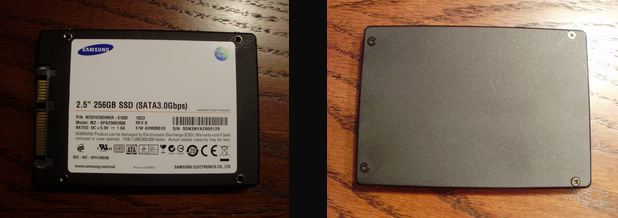The Samsung 470 Series SSD is the top performing SSD tested since our first was published in 2007. If you are considering a SSD purchase, this article is a must as it compares four of the best SSDs available today. Read on!!!
.
Solid state drives were first introduced to the consumer in 2007 and Samsung was one of the first out of the gate with their initial release of a a 64Gb slc SSD as we reviewed here on April 20, 2008. This would definitely mark Samsung as a pioneer in the SSD field and most agree that they seem to have weathered the well published growing pains of ssd hiccups rather well. This is due in part to their proprietary control over key SSD components that include the controller (Samsung S3C29MAX01-Y340) , 256MB DDR2 (667Mhz) DRAM module and NAND flash memory chips. Samsung has a very unique way of displaying this on their ssd site here.
For those new to SSDs, most manufacturers assemble their products with components built elsewhere and the best example is that of SandForce controllers found in products sold by APacer, Corsair, G.Skill, Mushkin, OCZ, OWC, Patriot, Renice, and Super Talent to name just a few. Samsung and Toshiba play key roles in the same arena with their supply of NAND flash memory which is also used in many competitive SSD brands. In fact, the consumer can still find SSDs today that were originally completely manufactured by Intel and Samsung only to be sold to competing companies who then simply put their branding on the product and sold it as their own.
PHYSICAL DESCRIPTION
This SSD review is going to examine the Samsung 470 Series 256GB SSD which has a product number of MZ5PA256HDMR – 0100 and firmware revision of AXM0601Q. The consumer version appears to be of brushed aluminum with an orange mark on the bottom right of the drive face, a marking that is fast becoming an easily recognizable trademark of Samsung SSDs. The SSD received by The SSD Review differs completely on the exterior and is a solid black plastic casing with a descriptive sticker on its face. A quick check with Samsung confirms that it is an evaluators version of the drive, pictured as below.
The most interesting view of this SSD is the actual shot of the circuit board. It contains Samsung 30nm NAND flash memory chips which are a great deal smaller than previous flash memory and will eventually provide for SSDs with a much larger storage capacity. It is fascinating that the entire circuit board is much smaller rather than simply using the same board with additional memory. Take a look at some pictures of the products interior as well as the new circuit board compared to that of another manufacturer using traditional sized board and memory.
SPECIFICATIONS
| Model | 470 Series | 470 Series | 470 Series |
| Capacity | 64GB | 128GB | 256GB |
| Form factor | 2.5-Inch | 2.5-Inch | 2.5-Inch |
| Dimensions (Height x Width x Length) | 9.5×69.85×100 (mm) | 9.5×69.85×100 (mm) | 9.5×69.85×100 (mm) |
| Weight | Max 64g | Max 68g | Max 68g |
| Interface | Serial ATA 3.0Gbps | Serial ATA 3.0Gbps | Serial ATA 3.0Gbps |
| Sequential read | Up to 250 MB/sec | Up to 250 MB/sec | Up to 250 MB/sec |
| Sequential write | Up to 170 MB/sec | Up to 220 MB/sec | Up to 220 MB/sec |
| Random read1 | Up to 31,000 IOPS | Up to 31,000 IOPS | Up to 31,000 IOPS |
| Random write1 | Up to 11,000 IOPS | Up to 20,000 IOPS | Up to 21,000 IOPS |
| Active power use | 0.24W | 0.24W | 0.24W |
| Idle power use | 0.14W | 0.14W | 0.14W |
| Allowable voltage | 5V± 5% | 5V± 5% | 5V± 5% |
| TRIM support2 | YES | YES | YES |
| Reliability (MTBF)3 | 1.5 million hours | 1.5 million hours | 1.5 million hours |
| Warranty | 3 year (= 21.9TBW, 20GB@day) | 3 year (= 21.9TBW, 20GB@day) | 3 year (= 21.9TBW, 20GB@day) |
| Temperature | -55? to 95? (Non-Operating) | -55? to 95? (Non-Operating) | -55? to 95? (Non-Operating) |
| Humidity | 5% to 95% (Non-Operating) | 5% to 95% (Non-Operating) | 5% to 95% (Non-Operating) |
| Vibration | Operating: Random 2.17Grms(5~700Hz) Non-Operating: Random 3.13Grms(5~800Hz) Swept sine: 20G peak @10~2KHz |
Operating: Random 2.17Grms(5~700Hz) Non-Operating: Random 3.13Grms(5~800Hz) Swept sine: 20G peak @10~2KHz |
Operating: Random 2.17Grms(5~700Hz) Non-Operating: Random 3.13Grms(5~800Hz) Swept sine: 20G peak @10~2KHz |
| Shock | 1500G, duration 0.5ms, Half Sine Wave |
1500G, duration 0.5ms, Half Sine Wave |
1500G, duration 0.5ms, Half Sine Wave |
PG 1 – PHYSICAL CHARACTERISTICS
PG 2 – TESTING CRITERIA
PG 3 – BENCHMARKS
PG 4 – FINAL THOUGHTS
 The SSD Review The Worlds Dedicated SSD Education and Review Resource |
The SSD Review The Worlds Dedicated SSD Education and Review Resource | 


This arrived as a pingback and leads to the only other review we have seen of this drive. It confirms our finding and also presents tests that confirm how effective the GC is in this drive.
Does it use less power than the Intel drive? I’m thinking of buying the 256 GB one.
SITE RESPONSE
Samsung
Active power use 0.24W
Idle power use 0.14W
Intel
Active power use 150mW
Idle power use 75mW